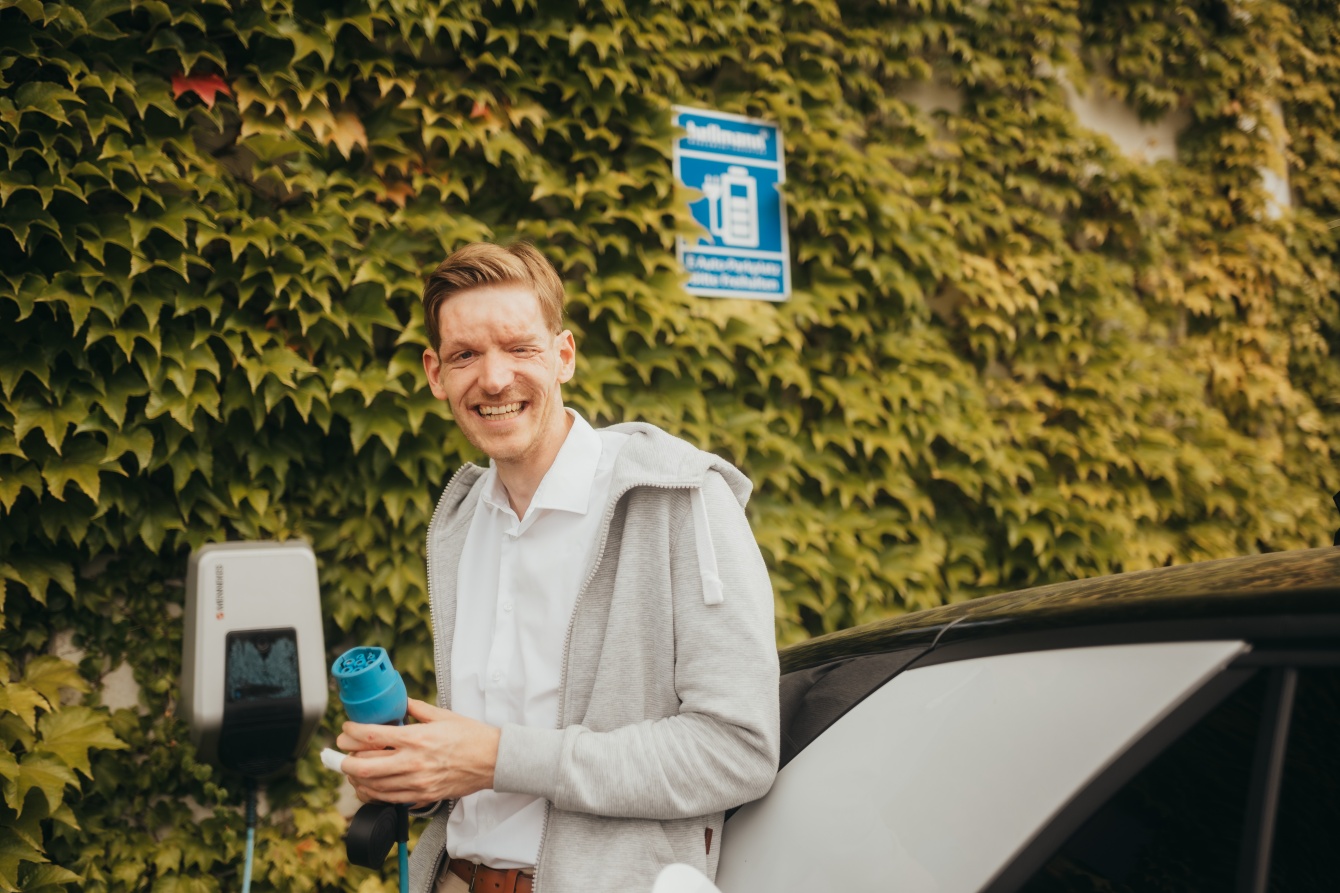
Environment
For logistics companies, energy consumption and emissions are important factors for sustainable development.
Energy
Energy consumption has a direct impact on Hellmann's costs and, at the same time, with the implementation of the European Energy Efficiency Directive in Europe, the legislative authority has given the topic of energy a central role. As a result, energy consumption by companies is also increasingly in the public eye. Against this backdrop and due to Hellmann's established understanding that the responsible use of resources is essential, the topic of energy has been identified as a key issue.
...read more
Since 2017, Hellmann has established a certified energy management system in compliance with ISO 50001 according to the national implementation of the aforementioned EU directive (ESOS in the UK and EDL-G in Germany) at all major locations in Germany and the UK. In the course of this, regular energy assessments of these sites are carried out and improvement measures are evaluated in line with the standard.
Since the end of 2021, energy consumption at Hellmann has been recorded globally. The responsibility for this lies centrally with the department of QHSE. The consumption data is compiled by the respective managers in the countries, aggregated per region and then transferred to a central reporting system. This is used to determine the company's total emissions. Monthly reporting also supports the planning and evaluation of improvement and reduction measures. The energy consumption for Hellmann, which was recorded globally for the first time, totaled 100,960 megawatt hours for the financial year 2022. The main region here was Europe, with 67,902 megawatt hours. Further details can be found in the table below:
| Region | Megawatt hours 2022 |
|---|---|
| APAC | 10,403 |
| AMCS | 8,474 |
| IMEA | 14,181 |
| WEUR | 67,163 |
| EEUR | 739 |
| TOTAL | 100,960 |
* Due to the effects of the war in Ukraine, data from Eastern Europe were only available to a limited extent at the time of collection.
In the reporting year, among other measures, old heating systems in the buildings were successively replaced by energy-efficient technologies such as geothermal systems. As a result, the company is continuously reducing its consumption of heating oil. In addition, further measures to reduce consumption (e.g. by adjusting the heating curve and lowering the flow temperature) were implemented during 2022 to also reduce consumption of natural gas, which led to a significant reduction in heating-related emissions. For further energy reduction, the company relies on economical LED lighting in its warehouses as well as the use of high-frequency lithium-ion batteries for industrial trucks.
Ultimately, the employees of a company the size of Hellmann, with almost 14,000 employees worldwide, also have a significant influence on energy consumption. Employees worldwide are made aware of their responsibility through regular training, continuing education and various awareness-raising measures. In the reporting year, training courses were also held in Germany for QHSE and energy officers in relation to the integrated management systems (including ISO 50001). In this context, an existing e-learning program was revised, which will be rolled out from 2023 and continuously assigned to the responsible employees. Control processes are currently taking place for the ISO 50001-certified locations mentioned above as part of internal and external audits.
The declared goal is to optimize energy consumption continuously on the basis of the data collection and the evaluations described above. Measurable key figures for reporting the improvements will be targeted in 2023, as soon as the prior-year figures are fully available for comparison.

Daniel Huelemeyer, Global Head of QHSE & Sustainability:
“The topic of sustainability is of central importance for our company’s further strategic development. That is why we are now building on our solid foundation and will develop globally uniform standards across the board so we can define a worldwide climate target for the Hellmann organization. Because there is no doubt that we will continue to focus on sustainability in the future and want to move forward as a pioneer.“
Emissions
The reduction of emissions is another essential aspect and a central strategic goal with regard to the company’s future ecological orientation in order to make an adequate contribution to combating climate change. In this context, the central factors result from the reduction potentials in the area of energy, since there is a direct connection between energy consumption and the resulting emissions.
...read more
A basic distinction is made between company-specific and product or service-specific emissions at Hellmann. The Management Board is responsible for what is known as the company carbon footprint (CCF), i.e. the emissions that the company can influence directly. The CCF will also be integrated into corporate reporting in the future. The product carbon footprint (PCF) describes the ecological footprint of a service or product in its entirety, i.e. in the case of logistics along the entire supply chain. This value is of particular importance for customers and external stakeholders, as they require the information for their own sustainability reporting. As a result, the PCF is an important criterion for the selection and evaluation of logistics service providers and also a key element in the assessment by sustainability audits. In addition, the measurement and reduction of all emissions will also be an important part of the annually required end-of-year reporting.
Therefore, emissions transparency and balancing play an important role. These are subject to the recognized guidelines and standards according to the European standard EN 16258 and GLEC (Global Logistic Emission Council). At the same time, the company is preparing for the implementation of ISO 14083, which will redefine standards of emissions accounting* in logistics. The responsibility for this lies with the department of QHSE.
*The company bases its accounting of company-specific emissions on the three scopes of the Greenhouse Gas Protocol. Hellmann is preparing an emissions report for the reporting year 2022 for direct emissions (Scope 1) and indirect emissions from its own electricity consumption (Scope 2). The company is planning a comprehensive analysis and preparation of an emissions report for indirect emissions (Scope 3) for 2023.
Illustration of emissions calculation according to the Greenhouse Gas Protocol:

The emissions survey for Scope 1 showed 19,196 metric tons of CO2 equivalents in the reporting year and a total of 5,258 metric tons of CO2 equivalents for Scope 2. Since the end of 2021, energy consumption at Hellmann has been recorded globally for selected site. Further details can be found in the table below.
| Region | Scope 1 | Scope 2 | Total Emissions |
|---|---|---|---|
| APAC | 437 | 1,273 | 1,710 |
| AMCS | 290 | 1,845 | 2,135 |
| IMEA | 1,108 | 1,405 | 2,513 |
| WEUR | 17,177 | 706 | 18,882 |
| EEUR* | 184 | 29 | 213 |
| Total | 19,196 | 5,258 | 24,453 |
Figures in CO2-equivalent metric tons
* Due to the effects of the war in Ukraine, data from Eastern Europe were only available to a limited extent at the time of collection.
In addition to the transparent calculation of the emissions caused, the reduction of these emissions is a central topic for Hellmann in its strategic corporate orientation. Avoiding emissions is the top priority here: Increased capacity utilization and more efficient use of transport capacities can bundle shipments and thus avoid additional or superfluous transports. Overall, however, the expansion of rail transport remains the most effective measure for reducing CO2. According to current calculations, Hellmann saves around 89 tons of CO2 per day (calculated on a flat-rate basis) by shifting domestic German transport to rail alone. Thanks to the switch to green electricity initiated since the end of 2022 in all German rail transport realized by Hellmann, these savings will be significantly greater in the future. Furthermore, unavoidable emissions are being reduced, for example, by using alternative fuels. In 2021 and 2022 new approaches were also taken in airfreight: As part of a project-based cooperation, the company purchased Sustainable Aviation Fuel for airfreight. The resulting CO2 savings were also passed on to customers.
In addition, emission-free electricity was purchased at all German sites in the reporting year, meaning that 100 % CO2-neutral electricity was consumed as an energy source. In total, around 6,000 metric tons less CO2 were emitted compared to 2020. The aim is to transfer this approach to other countries in the future. Another example is the modernization of the truck fleet. In 2022, approximately 20 % of Hellmann's truck fleet already consisted of gas-powered trucks. Due to the extreme shortage of liquefied gas resulting from the war against Ukraine, this had to be temporarily taken out of service in the reporting year (from August to October 2022). In addition, the use of electrically powered test trucks was further advanced in 2022 and will be tested with further trials in the course of 2023.
At Hellmann, the balancing of shipment-related emissions is partially automated and is carried out with the help of the EcoTransIT software solution. In addition to the standard values obtained from EcoTransIT, the company also uses the SmartAir! internet platform, co-developed by Hellmann, to calculate emissions even more accurately. The strategic goal for 2023 is to further optimize the complete and automated calculation. In addition, in the reporting year, the total emissions for the LCL sea transport sector from the second half of the year amounting to 3,845 tons of CO2 were fully offset via offset projects in cooperation with MyClimate. Based on the emissions data, the company is currently developing alternatives to existing products in order to further reduce emissions.
In summary, Hellmann has two main goals for reporting of emissions: For the CCF, the complete presentation of a holistic corporate emissions report across all three scopes is the goal by 2024 in order to derive science-based targets (SBTI). For the calculation of the PCF, the focus is on greater automation of the calculation as well as on integration into the Hellmann system landscape and the transport management systems.

Monika Schalldach, Specialist Quality Health Safety Environment & Sustainability:
”Hellmann has stood for sustainability for generations. In addition to the social dimension, the ecological dimension plays a central role in our industry. With regard to the strategic avoidance and reduction of emissions, the compilation of a complete carbon footprint is essential: For this purpose, it is fundamental to be able to quantify the corporate ecological footprint as precisely as possible, in the best case on the basis of primary data.“







